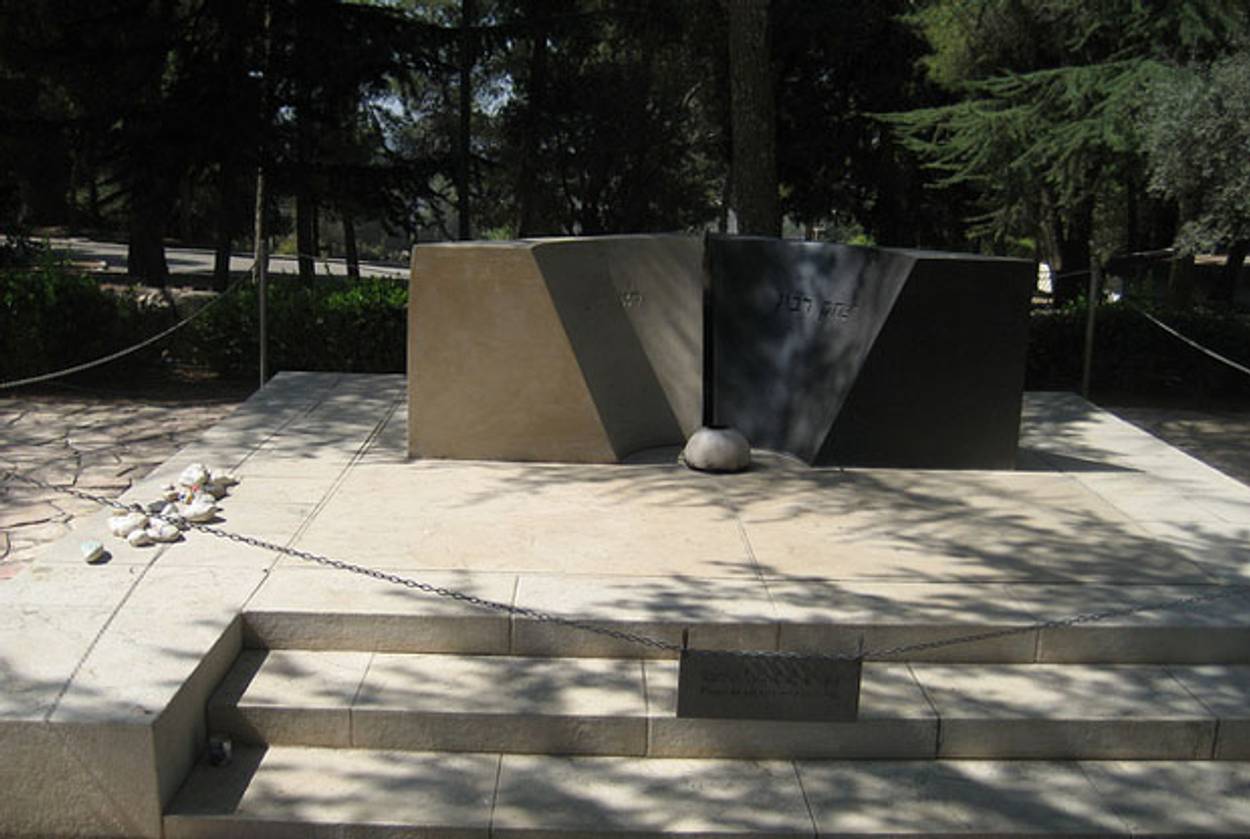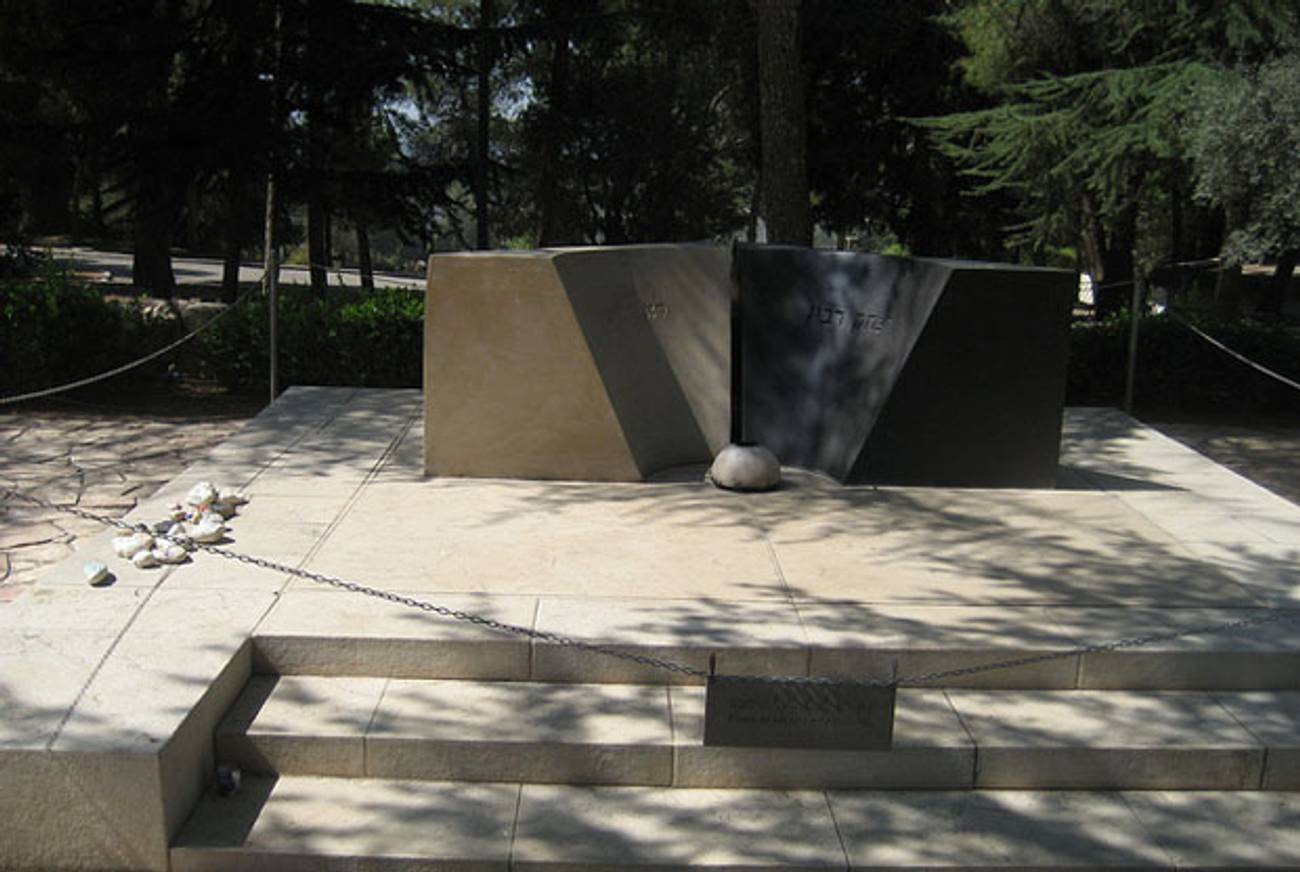Truth-Telling at Rabin’s Grave
An Israeli who prayed for the late prime minister’s demise bravely comes clean at his tomb




Hints of our tour educator Yoav’s personal politics have trickled out over the past seven (it’s only been seven!) days of knowing him. He’s fond of citing the Prophets and referring to various tragedies that have occurred on Tisha B’Av, the holiday on which, by tradition, both Temples were destroyed. At Saturday morning’s b’nai mitzvah, he chanted Torah, and later explained that he knew the whole thing by heart. During a candid conversation on Ben Yehuda Street Saturday evening, he foreswore party identification, but disclosed that in the most recent elections he voted for Likud. But it was Sunday, at Har Herzl, Israel’s main military cemetery, where we—where I, anyway—gained real insight into Yoav’s politics, Yoav as a man, and how the two intertwine.
Though I’ve craved more exposure to real Israelis in the cities we’ve toured, getting to know Yoav has been an education into the Israeli people. They don’t make them like him elsewhere.
Near the base of Har Herzl, tiers of tombs all facing the Old City, we gathered around a particular grave as the soldiers nodded grimly: this was one of Israel’s most famous martyrs, one whose name is household here; they all knew his story. I already knew his story, too. His name was Ro’i Klein, and he died during the Second Lebanon War, in 2006, when he jumped onto a grenade to save the lives of six of his soldiers.
Yoav knelt down, lit a candle, and opened his binder to a picture of the young man. He began to speak, with self-conscious drama, of how he knew Klein. They had attended the same pre-military yeshiva. This yeshiva was in the settlement of Eli—a settlement more controversial than the average one; a settlement controversial enough that a whole neighborhood there was recently uprooted, which mean the destruction, yes, of the home of Roi Klein’s family. At the yeshiva, Yoav and Klein, along with several other friends, trained hard for the IDF, none harder than Klein; they also studied Torah and honed their belief in the prerogative of Jews to settle the Land of Israel, including Judea and Samaria. They lived in Eli following their yeshiva time and military service. In Klein, Yoav described a man at once gentler than any other and fierce when it came to combat, a man who referred to his soldiers as his yeledim. When Klein fell onto the grenade, Yoav told us, he shouted out “Sh’ma Yisrael.”
This could have been macho-Zionist overkill. If I were reading this where you are sitting, I might think it was. I remain uncomfortable with (and most definitely unconverted to) Yoav’s politics. Yesterday morning, on the bus ride to our morning hike in the Golan Heights (a subject about which I am uncharacteristically hawkish and therefore do agree with Yoav), he and I had a pointed debate over the viability of a two-state solution. Somebody else complained that the settlements are not given sufficient attention on Birthright (we talked about the Syria conflict yesterday, we’re doing Lebanon today), and I agreed, and was only willing to give Yoav a partial pass when he noted that Birthright doesn’t send its charges to the settlements or the Palestinian cities and towns of the West Bank.
But I hope you trust my testimony that Yoav’s beliefs have the credibility of perspective earned and fought for. And he loves Israel and the Jewish people. My Roll colleague Akiva Gottlieb thought to ask him where the grave of Uri Grossman, one of the last Israelis killed during the Second Lebanon War and the son of the dovish novelist David Grossman, was, and Yoav was able to tell us its exact location and quickly send us there while the group tarried.
But I’ve saved the reveal. When we ascended Har Herzl, we went to the grave of just one of Israel’s former leaders, Prime Minister Yitzhak Rabin. Yoav explained to the group Rabin’s story: the great Israeli commander and war hero turned Labor politician and prime minister who initiated the Oslo peace process with the Palestinians, only to be struck down by the bullet of a Jewish Israeli assassin in 1995. Then Yoav disclosed that as a 19-year-old yeshiva student, he had prayed for it. While extreme, the sentiment was not unheard of; in March, Shmarya Rosenberg wrote in Tablet Magazine that at the time he and others wished and even plotted to kill Rabin, under the theory that his willingness to cut deals with Yasser Arafat put Jewish lives at risk. Yoav admitted that even his rabbi at the time, the rabbi of a religious Zionist yeshiva in the West Bank, would have condemned this position. But he held it nonetheless, and he came clean about it to us.
“But—and there is always a but,” Yoav would say, as it is one of several epithets he relies on in talking to the group. When Rabin was killed, Yoav said he realized how horrible his mindset had been. He called the Rabin assassination “the greatest lesson” of his life, and said he vowed back then to name his first son Yitzhak. Yoav’s son, middle name Yitzhak, recently turned 14.
This won’t be true for everyone, but for me the content of Yoav’s beliefs are secondary to the structure of his believing. I would have voted for Rabin, and probably to re-elect him; I am disgusted that anyone, much less fellow Jews like Yoav, wished for Rabin’s death. But the lesson I take from Yoav–and I know it can be traced to some of the worst Zionist stereotypes of diaspora Jews, but so be it–is that Israel is a place that allows for a Jewish life with wider swings and greater drama than anywhere else in the world.
That’s not the life for me. In fact, Jewish history is such that I think the Jews should minimize the amount of drama surrounding them. But as one of those Jews for whom this is not and should not be my life, it is important to know that the age of Jewish heroism and Jewish villainy isn’t over.
Marc Tracy is a staff writer at The New Republic, and was previously a staff writer at Tablet. He tweets @marcatracy.
Marc Tracy is a staff writer at The New Republic, and was previously a staff writer at Tablet. He tweets @marcatracy.